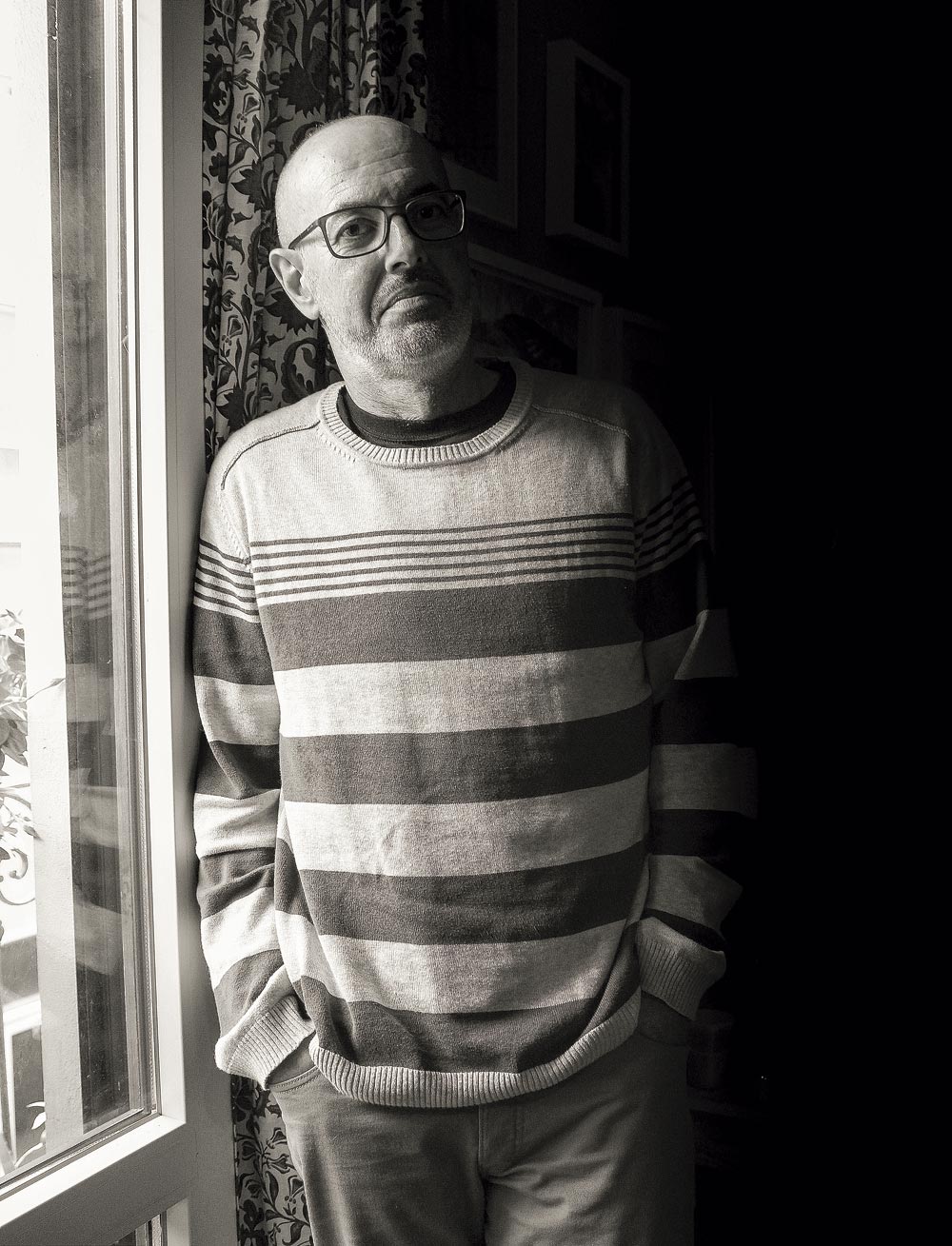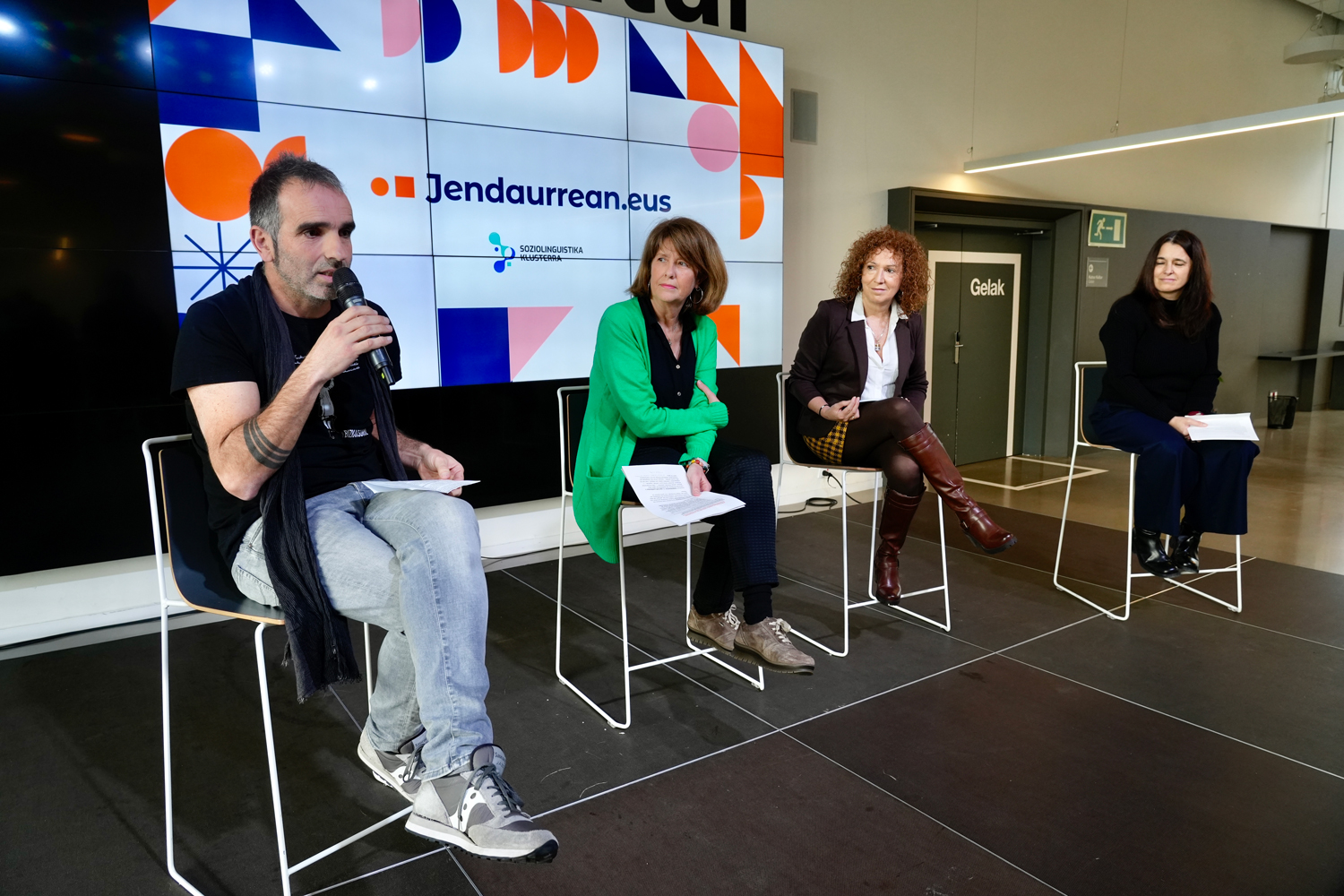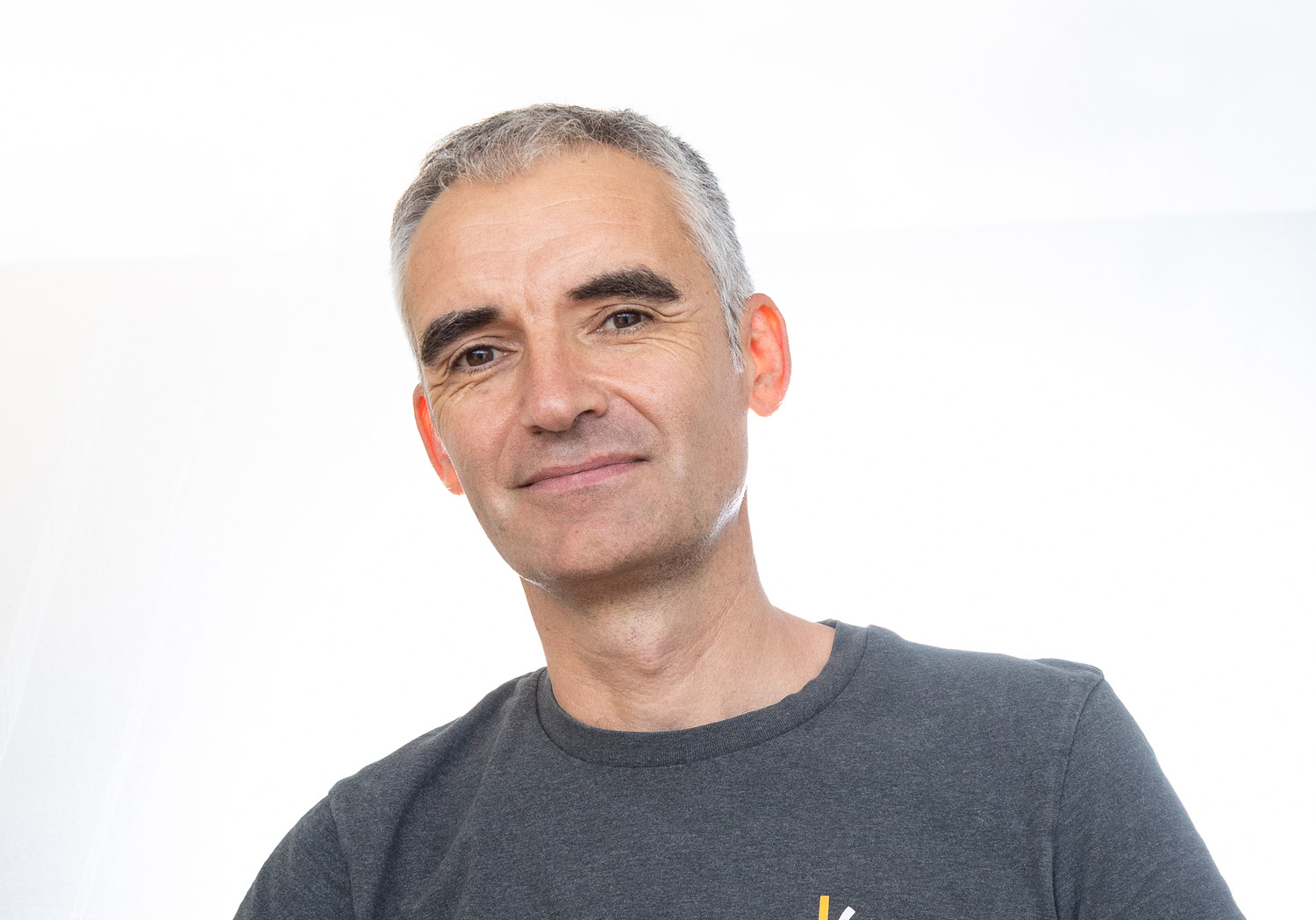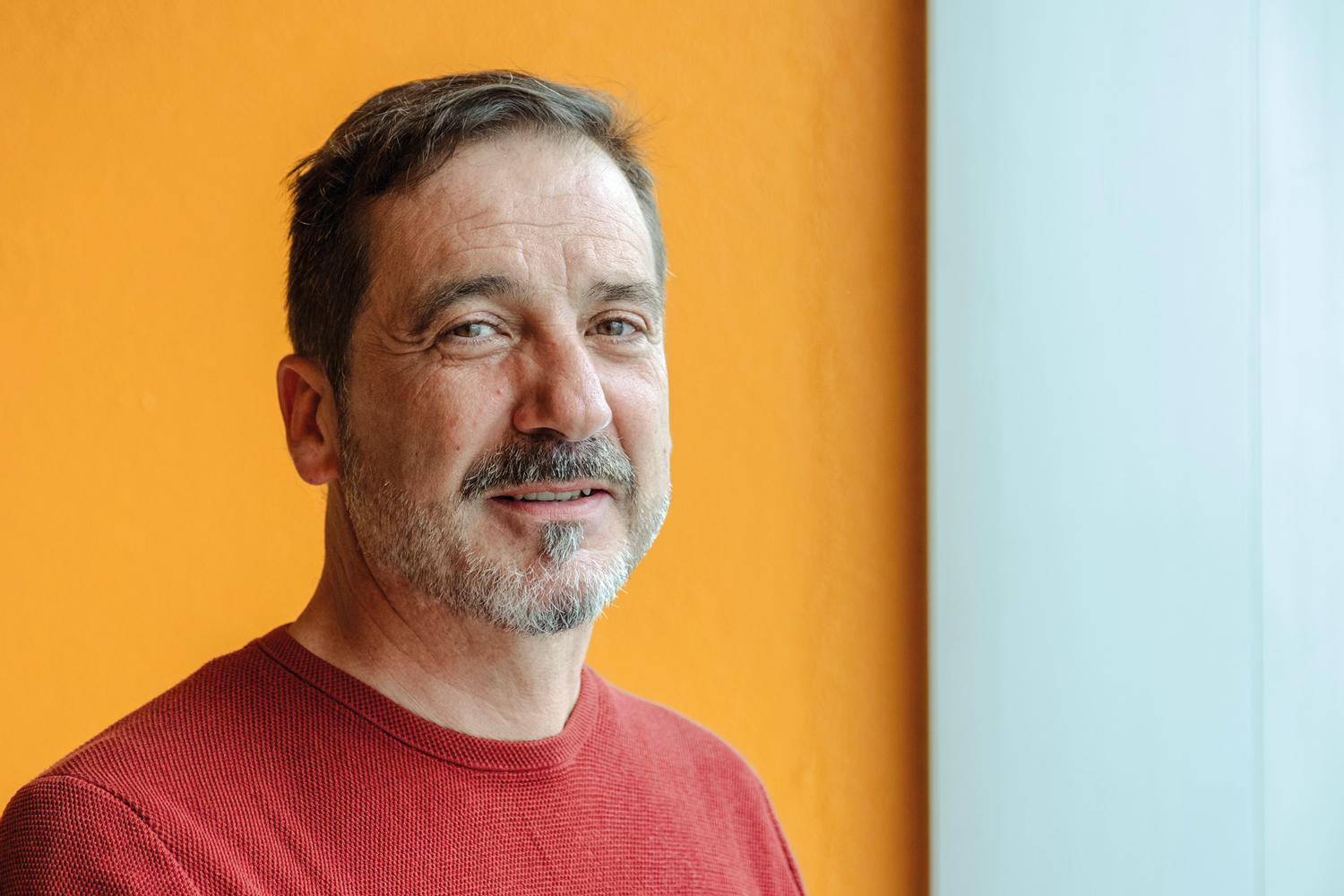"Through my experiences I made my affective connection with the Basque Country"
- Our interlocutor reflects, in writing. “The scarce use of Euskera from the point of view of an Euskaldun berri in Bilbao,” he says. He is optimistic, although he has been pessimistic on several occasions during the interview, in which he has wanted and has not been able to live in Basque.

Ingeniaritza ikasketak egina. Gorabeheraz betea du euskararekiko bidea. Donostian hasi zen euskara ikasten, Bilbon eman dio errematea, 2003an, euskaltegira itzulita. 2013an minbiziak jo zuen, eta lanerako ezindua, euskal kulturaren munduan murgildu zen. Berbalagun eta Mintzaneteko kide, ARGIA, Berria, eta Jakin jasotzen ditu etxean, irakurle klub bateko partaide... euskaraz bizi nahiz bizi da, eguneroko bizimodukoak ez diren bestelako bideetan, euskara erabili nahiz. On Kixote bat, Eremuko Simon bat, Txema Aizpurua.
Where has your thoughts come from?
I am in Mintzanet and once a week I meet two friends. Every Tuesday, a girl who lives in Barambio. This is a man who lives every Wednesday in Algorta. Last year they set up a forum in Mintzanet to make our views known and others known. But the forum was not warmly welcomed, and then the project leaders asked me to write something. But I had already reflected, and I just had to put my coconuts on paper. But when I reflected, I didn't get almost any answer.
You talk about the lack of use of the Basque language in their minds.
Yes, very deficient, use in Bilbao. We are Donostiarras, but we came to live in Bilbao in 1997, for work reasons. And in fact, here I started to learn Basque seriously, in 2003. Two years later, I got out the EGA. However, I had no possibility of using Euskera in my work. Then, I got the disease, and because I couldn't work, I had more room to dedicate to the Basque.
You have defined yourself as “Euskaldun berri”, at the head of your written reflection.
That name, “euskaldun berri,” is on the street, and I've taken it for myself. But I don't know how long I'll be Euskaldun berri. By the age of 55, we can't get much news! Ha ha ha! Basque cult, if not. But that's not complete either. “She learned Basque,” she should say. It wasn't taught to me by my mother, I didn't pick it up at home. Euskaldun berri... A kind of Don Quixote or Simon de Campo.
The Basque in his loneliness, you.
I belong to a reading club organized by the foral library and run by Julen Gabiria. We've still read Clarice Lispector's clandestine happiness. I didn't know that writer, and I appreciated Julen's choosing his book. Lispector states that he does not believe in reason, that he admires the life of animals, that in animals mental souls unite. On the contrary, human beings over the years invented masks and covers to hide, on the one hand, and on the other, to explain to us how society wants us: we use a quilt at work, another at home, a third in street friends. In this sense, the disease has taught me that we have to demonstrate the inner character, the authentic one, in order to be happy. There is no other joy of living. If we go with decks, our interior will be in the background, unable to leave. It is disappointing.
Are you disappointed by the scarce use of Euskera?
Completely disappointing. I work to be Basque, to taste, but the language is to communicate with the next one, to relate, and in Bilbao we have few opportunities. You will go out to the street and you will hardly hear the Basque. Perhaps, in the amusement park, the parents will speak in Basque with their children, and in the rest, they will speak in Basque at certain points, either in the Kafe Antzokia or in the environment of the Euskaltegi of AEK Parte Zaharrean, in the Somera Bira association, in the marginal events of the Arriaga Theatre in Basque... They are specific areas. That is something that cannot be denied. Thanks to them we live, or can live, in Basque.
The Euskaltegis are there, most of the students, in model D, but because they are in a totally castilized area, they are like our memories...
The work we do is not the result that it should bring. Don't even think about it. I would say that, on many occasions, all these works have an opposite effect. I do not know, for example, whether those who learn Euskera by obligation do not, to some extent, even hate Euskera. To hate, to be grudging. So many oppositions, profiles, rewriting and others. It's a tired job, nothing attractive. If you don't love it, you get the opposite effect. And also, once the learning process is over, if you don't have the possibility to use it, it's over! The situation is difficult. If we see Euskera as a mere tool, it does not work, we will do nothing, since we always have Castilian, to communicate with each other. Using the Basque language requires an affective bond, a certain enthusiasm, a certain impulse. Why did we choose Euskera the ones who selected it? Because we love her! It's linked to love. There may be militancy, there may be an environment of sociability... but that affective bond is essential. If you have received the Basque at home, then you have the link, both with your mother and your parents. In this Bilbao there are few people who have received the Basque of their mother.

He has also made a proposal to deepen knowledge of Basque culture.
Yes, yes. Show, along with language, history, culture, film, sports, games, literature... What gives importance to language? What gives it prestige? They are produced in this language. If we learned German, if I didn't know who Goethe, Kant or Hegel were and what they wrote, it would be a very bad thing. It would be a great disregard to learn French and not to know the work of Truffaut, Jacques Brel, Edith Piaf and the other authors. Knowing the work of these creators, I can come to love the culture that comes in that language and so learning languages is much more attractive.
That is what, in his view, should be done in the case of the Basque Country.
Of course. Affective bonds must be sought in order to use a language that parents have not taught him. If not, external agents will be required for those of us who know Basque to speak in Basque. In Bilbao, however, external agents, the street environment, etc., do not push you to speak in Basque, quite the opposite, not to use Basque. The use of Euskera brings you problems in Bilbao. Sometimes, when a wrestler gets up, he can tell himself: “Today I will speak in Basque!” You can go out to the street, go to the store and start asking in Basque, but the answer you receive many times will be very negative. “But what does this do!” We are in Euskal Herria, but as if we were in Madrid. In the end, it's very nasty.
He says he talked to his children before he helped us.
I asked them why they didn't use Euskera. Always without rebuke. I told them that I was bringing you, and that I wanted to know the truth about them, that even when I tried to talk to them in Basque, they answered me in Spanish. They did not hesitate to answer me, and the two sons adopted the same opinion: “It’s more comfortable.” They told me that Castilian predominates on the street and that, on the other hand, they did not have the skills to speak in Basque, that it was difficult for them and that, as far as possible, they resort to Castilian. To some extent, their position is understandable, as the human being tends to do things in the simplest way possible. My wife and I also met speaking in Spanish, and today, thanks to my insistence, we sometimes tried to speak in Basque.
You've written that society has to get organized.
Yes, create communities. According to the last socio-linguistic survey, the level of knowledge of Basque in Bilbao is very high. Its use is almost null. The Basques of Bilbao are very dispersed, we have no ties. In that we are a reflection of society, each one of us living in its own hole, bound to the Internet. And so, we're more likely to talk to someone who lives in the United States than to someone who lives in Bermeo. That's our way of life. That's why I say we should create real communities, and that's why I find Euskera a perfect excuse. Communities can be both physical and virtual, but physical relationships are essential, in my opinion, because physical closeness is essential for empathy to emerge. If the physical relationship is strengthened, you can be monitored virtually via skyp, whatsapp or whatever.
It proposes stays in areas where dialects of one dialect and another dialect are spoken. And you are not the first.
Long stays to understand the local dialects and to be able to feel that we really live as Basques. It is difficult to understand, but in twenty minutes we have to go to Bermeo, or to Ondarroa, or to Ipar Euskal Herria, and we have to do everything we can to understand Basque. They say that dialects have to be regulated, says Koldo Zuazo, for example, and I agree. But, on the other hand, what do we mean that to be Euskaldunes we have to learn all the dialects? And on top of Hitan? What about the expressions of each valley? I remember a woman from Lastur, who told us that we had to study in Basque. On one occasion we learned, and as soon as she began to speak in Basque with this woman, she went to Spanish!
Look, the other one!
Yes, yes! He spoke his Basque language, he was not a schooled language, our unified Basque, sometimes perfect and others not so perfect, it was strange to him. And when I go to the mountain, they ask me in Basque about the way up to the top and answer me in Spanish. I guess you think I speak a weird dialect. I don't know, but I think all Euskaldunberris have had something like this. We must be aware that we are in this situation, so that people living in respiratory areas receive us better than those who live outside them. After all, it would only be a matter of making facilities available to those of us who are making efforts. Like in Euskaraldia.
In Euskaraldia?
What is Belarriprest going to do? To make it easier for Ahobizi to speak Basque. Let us hope that the situation will gradually change.

Wait. What do you expect from Euskaraldia?
Few things ... I'm an optimist in fact, and I wouldn't want to be pessimistic about this. I hope that the campaign will be effective, but in the present situation, I do not know if we will go very far. We know that knowledge is widespread, we know that we do not have the habit of speaking in Basque in our relations, and we also know that we have no news about the Basque culture. So what, even if you start talking about it, do you have to talk about? Are we going to have to have conversations without substance? That is what concerns me.
Euskaldun berria zu, Txema, how did it reach the Basque world?
When I was growing up, I didn't pick up the Basque at home. Still, I remember my mother visiting Zarautz. They spoke in a foreign language, they understood nothing at all. Years later, in school, the French teacher -- Etxeberri, of Iparralde -- fixed my name. In the exam, I wrote my name as usual: “Jesús Mari Aizpurua Echaniz”. When he returned to me, he had returned with a surname: “Etxaniz,” he put me. “But what is this?” I related this detail and the language my mother talked to my grandmother, and I invented. “He’s Basque!” Soon after the demonstrations, the assemblies, the need to run before the police began... The movement surprised me in the middle of adolescence, and militancy emerged within me, and through my experiences I made an affective bond with the Basque.
It has already been said, the affective link.
Look, I remember as a child we were on the San Sebastian regatta. The race was contested and the city flag was handed over to the winner. At the same time, someone opened the ikurrina and people started singing Eusko gudariak. Then the paternal grandmother wept. And I, surprised. Then I knew that grandma was a Basque, although I had not heard her speak in Basque. He had arrived in San Sebastian, but because of shame, by prohibition or for any other reason, they lost or hid the Basque language, they saw that his language was not useful for living in the city. These types of experiences contribute to establishing an affective bond with the Basque Country. At present there is no affective link of this kind. Euskera is a matter of love. If you don't love it, it doesn't make sense, it's not worth it.
“Bilboko leku euskaldunetako bat da Kafe Antzokia. Han inguruan bai, entzuten da euskara, baina baita gaztelania ere. Asko, gainera. Ostiral eta larunbat gauetan, gehiago entzuten da gaztelania, euskara baino. Nik esatera, gehienbat bertako euskaltegiko irakasle-ikasleek erabiltzen dute”.
“15 urte nituela, gurasoek euskara akademia batera bultzatu ninduten. Betebehartzat hartu nuen euskaraz ikasi beharra. Gogoz kontra joaten hasi nintzen, harik eta joateari utzi nion arte”.
“Emaztearen eraginez, mendi ibilaldiak egiten hasi ginen Mendiak eta Herriak-ekin. Han ziren Felipe Uriarte, Xabier Erro, Martin Zabaleta! Nire heroiak, garai hartan. Euskaldunak ziren, gainera. Ahal nuen moduan egiten nuen haiekin euskaraz, eta okerrak egin arren, berdin onartzen zuten nire euskara. Handik lasterrera, Lesakako barnetegira joan nintzen”.
I think it will have to do with the hangover of the profession, but I have to acknowledge that I look at the linguistic landscape of the places I visit. Signs that stick on the walls, hanging from streetlights, billboards, and supports that appear in shops or companies (signs,... [+]
























